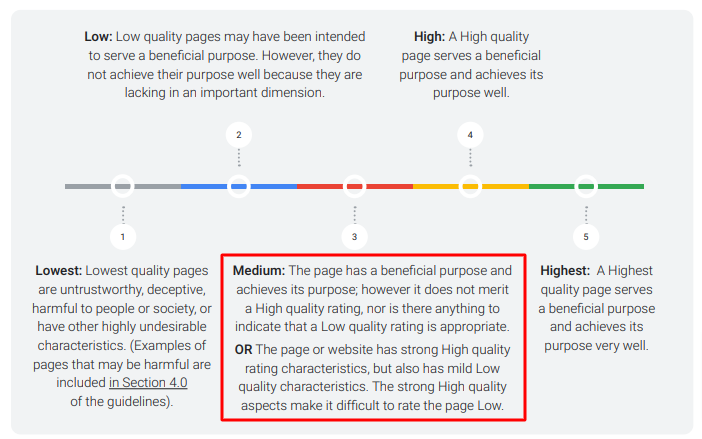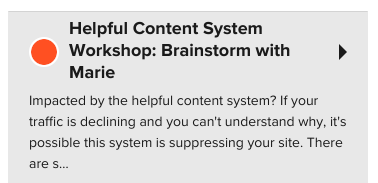Google's documentation on the helpful content system does not give us specific instructions for recovery. Their article on this system hints in a couple of places that the key to removing a suppression at the hands of this system is to "remove unhelpful content." However, they don't give much to specifically tell us which content is unhelpful.


In this article I will share my thoughts. I do believe that removing or noindexing large amounts of content will be necessary for many sites to see recovery. These sites will likely also have to work on producing new content that truly is helpful to searchers and not just stating known information.
I am currently brainstorming with several sites in an effort to improve following a suspected helpful content suppression. I should say though that the helpful content system is new (introduced in August 2022) and as far as I know there are no documented case studies on recovery. What you will read here are my mostly untested thoughts on recovery.
I have a couple of clients that have seen nice gains following a possible helpful content suppression. Unfortunately the sites that are doing well are ones for which I've signed an NDA and am not able to share their data.
What is unhelpful content?
Google is unclear.
It's possible that some articles can contain both helpful and unhelpful information. A good example of this are articles where the majority of the content is rehashing what others have already said, but part of the article is unique and helpful.
If impacted by the helpful content system, perhaps removing all of the rehashed content and leaving the bits that are helpful at meeting searcher need is the right tactic.
In the "extra content" of newsletter this week that I write for paid subscribers, we started diving into the topic of information gain. It makes sense to me that "unhelpful content" is content that provides little information gain. Or in other words, little information that adds to the body of knowledge that already exists on the web.
Or, it may be that entire pages containing content that is written without expertise or an intended audience in mind need to be removed.
I wasn't sure, so I asked Google's Search Liaison Danny Sullivan. His answer was not enlightening.
People should self-assess their content to understand if they believe it will be helpful to visitors. Keep content on pages or entire pages or whatever they believe is helpful. Get rid of things that aren't, if they're looking critically at them as a visitor.
— Google SearchLiaison (@searchliaison) September 1, 2023
This is vague and does little to help the site owner who believes they may be affected by the helpful content system.
According to Google's documentation on creating helpful content, there are many things that could cause content to be considered unhelpful.
- Copying or rewriting content from other sources without adding substantial additional value or originality.
- Having content that exaggerates or uses shocking headlines and titles.
- Having content with spelling, grammar, or stylistic issues.
- Content that appears sloppily or hastily produced.
- Mass-produced or outsourced content that doesn't get much individual attention or care.
- Content with factual errors or that shows lack of expertise on the topic.
- Content made primarily to attract search engine traffic rather than to help users.
- Extensive automation used to produce large volumes of content across many topics.
- Summarizing others' content without adding much value.
- Writing about trending topics without expertise just to get search traffic.
- Content that promises to answer questions with no actual answer.
- Content that leaves users needing to search again to get better information.
Sometimes it's really obvious which content is unhelpful. In most cases, though, it is not.
An example showing how difficult decision making is
Here is a site that came to me after losing traffic from Google search. It is virtually impossible to tell exactly what happened to this site. This is pattern I've seen commonly:
- Traffic from Google is down since early November, worsening November 15, 2022. Google has not said that November 15 was connected to the helpful content system. However, after analyzing hundreds of affected pages, in each case the content Google started to elevate above the site I'm analyzing is dramatically more helpful to the searcher when compared against competitors in the eyes of Google's guidelines. I highly suspect November 15 marks an unannounced change to the helpful content system.
- December 5, 2022. This was an announced helpful content update. Given seasonality, it's difficult to tell whether traffic reduces from this point, or whether the link spam update on December 14 is to blame.
- December 14, 2022. This was an announced link spam update. This site did indeed have unnatural links. There is no way of knowing whether links have simply been devalued by SpamBrain and this is responsible for the losses seen, or whether the losses are, as I suspect, due to an unhelpful content classification.

On one hand, we could simply assume that SpamBrain has neutralized links that were made for SEO purposes. If this is the case, this site can't do much in order to recover other than perhaps finding ways to truly get good links. Disavowing will not make those links count again.
But, what if this site is feeling the impact of an unhelpful content classification?
I have a theory that sites seeing declines since early or mid-November, from which they have not recovered, likely have been impacted by the helpful content system. If this is true, what should this site owner do?
There are a few options:
- Go through all of the site's content and noindex or remove anything that is not uniquely valuable.
- Go through every page and improve it so that the parts of the page that are helpful (i.e. add information gain) are prominent and easy to find.
- Ignore the past and move on by creating new content that truly does meet the needs of this site's real world customers.
Given Google's wording that I screenshotted at the start of this post, it seems to me that removing unhelpful content is necessary. It's likely not enough to just add more helpful posts.
Instructing site owners to remove/noindex content is a really big ask
I have found it difficult to convince sites to test my theory. The site pictured above has spent years, and much money creating content. The content is decent by SEO standards. But, when compared against other sites on the web, it's not substantially better than anything that currently exists online.
From Google's documentation:
- Does the content provide original information, reporting, research, or analysis?
- Does the content provide insightful analysis or interesting information that is beyond the obvious?
- If the content draws on other sources, does it avoid simply copying or rewriting those sources, and instead provide substantial additional value and originality?
- Are you mainly summarizing what others have to say without adding much value?
- Does the content provide substantial value when compared to other pages in search results?
For the site pictured above:
These are not spammy pages.
They're not useless pages.
They're not completely unhelpful.
But they are consistently not the best option for Google to present in front of searchers. Other pages that compete against them have more expertise, are more authoritative, or simply do a better job at meeting searcher need. I strongly suspect this site has been given an unhelpful content classification. This classification would allow Google to essentially say, "Unless it's quite obvious that users want to see content from this site, let's not even consider it."
Most of the sites I have seen that I believe are impacted by the helpful content system would fall into the "Medium quality" bucket as described in Google's documentation on how the quality raters work.

Medium quality content: The page has a beneficial purpose and achieves its purpose; however it does not merit a High quality rating, nor is there anything to indicate a Low quality rating is appropriate.
You could say, "Well, then just improve the pages!" Improving content to add information that truly would make it the best option to show searchers is no easy task. Adding from your experience, adding original insight, studies, images, and so on is not something you can outsource to an inexpensive copywriter. This type of improvement across content that has been published over the span of years, would take massive amounts of time and resources to accomplish.
The decision is even harder when you consider that most sites impacted have seen a significant decline in revenue.
I hope to be able to update this post with case studies.
When it comes to improving helpful content, my helpful content workbook can help you determine how to do that.
When it comes to noindexing or removing content, we are still in the testing/guessing phase. I do suspect though that in order to recover from a helpful content system suppression, significant amounts of content need to be removed.
Brainstorm with Marie re the helpful content system
On September 27, 2023, I'll be hosting a two hour discussion where we can brainstorm together on understanding the helpful content system and deciding what steps to take to recover. This is a paid workshop ($150). All participants will be given a copy of the recording plus the transcript.
As always, I'll share as much as I can in newsletter as I learn about this system. You can sign up for newsletter here:
The helpful content system remains ambiguous, but it's clear that site owners need to take action by removing or improving content that lacks originality, expertise, and true value for searchers. While not an easy decision, pruning unhelpful content and focusing efforts on new, high-quality content seems necessary for recovery. We still have more to learn about this system, but being proactive in evaluating and enhancing content now is wise. Stay tuned as we continue observing and testing strategies for overcoming suppression from Google's evolving helpful content assessments.




Comments
Many thanks for another helpful article.
I agree (from my own experience) that deindexing content that Google sees as low quality did (for me) lead to a ranking improvement.
My question: is it acceptable to link to deindexed content from pages that are 1 or 2 steps away from my home page? (I have deindexed gallery pages and also deindexed pages where customers share their experience of my murder mystery games BUT I want to link to these deindexed pages as it is helpful for potential customers to see how other people ran my games. The pages I link from are not my key sales pages but are informational pages to give helpful content to customers.)